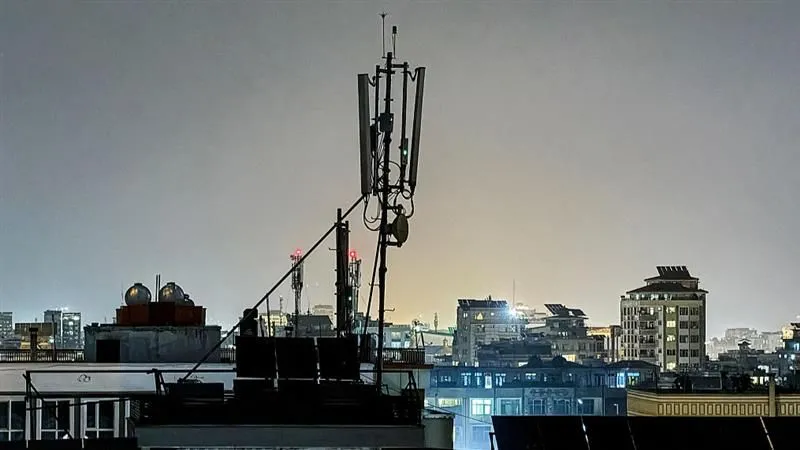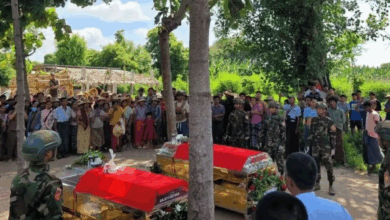Afghan women lose their ‘last hope’ as Taliban shuts down internet

Fahima Noori had big dreams when she graduated from university in Afghanistan.
She had studied law, graduated from a midwifery programme and even worked in a mental health clinic.
But all that was taken away when the Taliban swept into power in 2021. They banned girls over the age of 12 from getting an education, severely restricted job options for women and recently removed books written by women from universities.
For Fahima, the internet was her last lifeline to the outside world.
“I recently enrolled in an online university [and] I had hoped to finish my studies and find an online job,” she said.
On Tuesday, that lifeline was cut off when the Taliban imposed a nationwide internet shutdown that is set to last indefinitely.
“Our last hope was online learning. Now [even] that dream has been destroyed,” said Fahima.
Her real name has been changed to protect her identity, as have the names of all others interviewed for this article.
‘We all sit at home doing nothing’
Over the past few weeks, the Taliban government began severing fibre-optic internet connections across several provinces, saying this was part of an effort to prevent immorality.
For many, they feared this might be the first step towards an entire internet shutdown.
And on Tuesday, their worst fears came true. The country is currently experiencing a “total internet blackout” according to internet watchdog Netblocks – a move that has paralysed the country’s essential services.
International news agencies say they have lost contact with offices in the capital Kabul. Mobile internet and satellite TV has also been severely disrupted across Afghanistan. Flights from Kabul airport have also been disrupted, according to local media reports.
Ahead of the nationwide shutdown, the BBC spoke to some people in Afghanistan who detailed how the internet outages in their provinces had derailed their lives.
“Before this, I studied midwifery, but unfortunately that programme was banned for women… the only hope left for us was the internet and online learning,” said Shakiba, who lives in the northern province of Tahkar.
“We want to study. We want to be educated. We want to be able to help people in our future. When I heard that the internet had been cut, the world felt dark to me.”
It’s a similar tale for Fahima, who says she now feels “helpless”.
“My two sisters [and I] were studying online. We used to stay updated on news and technology through the internet, but now we cannot keep up or learn new skills,” said the student, who lives in an eastern province of Afghanistan.
“We dreamed of finishing our education and helping our father financially, but now… we all sit at home doing nothing.”
Since seizing power in 2021, the Taliban have imposed numerous restrictions in accordance with their interpretation of Islamic Sharia law.
Earlier this month they removed books written by women from the country’s university teaching system as part of a new ban which has also outlawed the teaching of human rights and sexual harassment.
Around 140 books by women – including titles like “Safety in the Chemical Laboratory” – were found to be of “concern” due to “anti-Sharia and Taliban policies”, said the Taliban.
The Taliban government has said it respects women’s rights in accordance with their interpretation of Afghan culture and Islamic law.

But it’s not just female students that have been affected – teachers like Zabi, who used to make a living through online teaching, have been similarly hit by the ban.
Zabi says he had previously worked as a journalist in Pakistan, but found no opportunities in the field when he returned to Afghanistan. He decided to open an English teaching centre – but was forced to take this online when authorities imposed restrictions on educational institutes, he says.
“I had men and women in my classes – up to 70 or 80 students at a time. My students were happy and our lessons went smoothly,” he said. “They were all preparing for the IELTS [a standardised English test] and all their learning depended on the internet. The research, the practice tests, the official exams, everything.”
Zabi, who also lives in the east of the country, adds that there is no IELTS centre in Afghanistan, so the only option for students is to take one online.
“Two days ago, about 45 of my students were in the middle of an exam when the internet was cut off. They had been preparing for it for months, but they missed the opportunity. It was heartbreaking for them – and for me as their teacher.”
He adds that he constantly gets calls from his students who don’t know what to do.
“They keep calling me asking ‘Teacher, what should we do?’ For the boys, there are still some English centres open, but for my female students, this was their last chance. And now even that is gone.”
Many of the interviewees say that there is still the option of being connected to mobile data – but that this is far too expensive for most, and that connectivity is patchy. A monthly plan with 100GB of data costs 3,500 Afghani, or around $50 (£37). In contrast, Wifi used to cost around 1,000 Afghani a month – which could be further split between a few students.
According to an earlier UNDP report, Afghanistan’s per capita income stood at $306 in 2024.
Zabi says he will need to leave the country if the internet is not restored soon – saying he has no other way of earning a living.
The Taliban have yet to give an official reason for the shutdown. They had earlier said an an alternative route for internet acess would be created, but did not give any more details.
Anas, a money changer in Takhar province, says his business has faced “enormous problems” since the internet shutdown, saying that much of his work depends on the internet.
“Our business has been affected by about 90%,” he says. “Yesterday, my brother who is also my business partner tried to send an email to a client. He couldn’t get it through.”
But his main concern are his three daughters – all of whom used to take online classes.
“The night before, we heard the Taliban had cut internet access in Mazar, and my eldest daughter came to me with tears in her eyes and said she feared the same would happen here.
“Their last opportunity to study is now gone. Seeing my children so helpless… [that was] the hardest for me. Only God knows what will happen to them and to me.”
DISCLAIMER: The Views, Comments, Opinions, Contributions and Statements made by Readers and Contributors on this platform do not necessarily represent the views or policy of Multimedia Group Limited.
DISCLAIMER: The Views, Comments, Opinions, Contributions and Statements made by Readers and Contributors on this platform do not necessarily represent the views or policy of Multimedia Group Limited.
Source link





